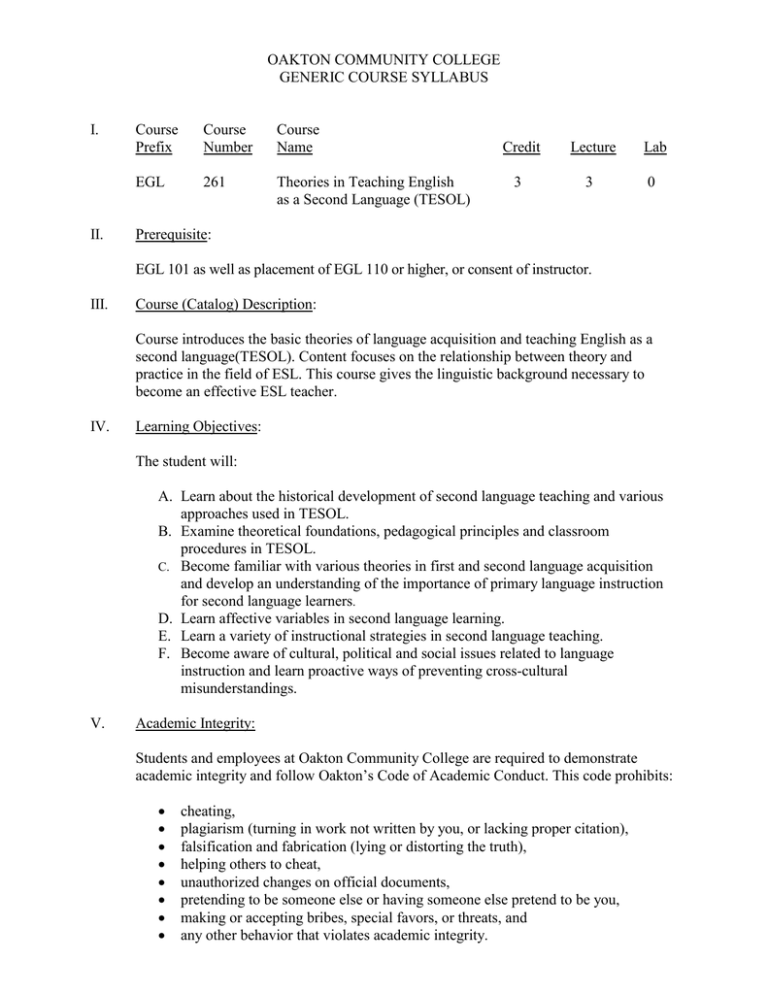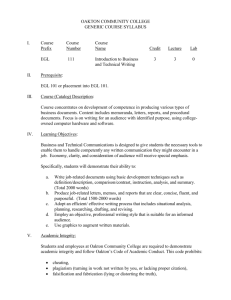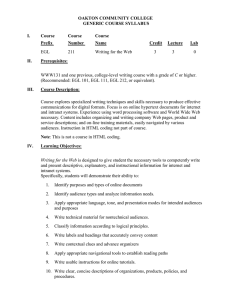OAKTON COMMUNITY COLLEGE GENERIC COURSE SYLLABUS I.
advertisement

OAKTON COMMUNITY COLLEGE GENERIC COURSE SYLLABUS I. II. Course Prefix Course Number Course Name EGL 261 Theories in Teaching English as a Second Language (TESOL) Credit Lecture Lab 3 3 0 Prerequisite: EGL 101 as well as placement of EGL 110 or higher, or consent of instructor. III. Course (Catalog) Description: Course introduces the basic theories of language acquisition and teaching English as a second language(TESOL). Content focuses on the relationship between theory and practice in the field of ESL. This course gives the linguistic background necessary to become an effective ESL teacher. IV. Learning Objectives: The student will: A. Learn about the historical development of second language teaching and various approaches used in TESOL. B. Examine theoretical foundations, pedagogical principles and classroom procedures in TESOL. C. Become familiar with various theories in first and second language acquisition and develop an understanding of the importance of primary language instruction for second language learners. D. Learn affective variables in second language learning. E. Learn a variety of instructional strategies in second language teaching. F. Become aware of cultural, political and social issues related to language instruction and learn proactive ways of preventing cross-cultural misunderstandings. V. Academic Integrity: Students and employees at Oakton Community College are required to demonstrate academic integrity and follow Oakton’s Code of Academic Conduct. This code prohibits: cheating, plagiarism (turning in work not written by you, or lacking proper citation), falsification and fabrication (lying or distorting the truth), helping others to cheat, unauthorized changes on official documents, pretending to be someone else or having someone else pretend to be you, making or accepting bribes, special favors, or threats, and any other behavior that violates academic integrity. Generic Course Syllabus EGL 261 Page 2 There are serious consequences to violations of the academic integrity policy. Oakton’s policies and procedures provide students a fair hearing if a complaint is made against you. If you are found to have violated the policy, the minimum penalty is failure on the assignment and, a disciplinary record will be established and kept on file in the office of the Vice President for Student Affairs for a period of 3 years. Details of the Code of Academic Conduct can be found in the Student Handbook. VI. Sequence of Topics: A. B. C. D. E. F. G. H. I. VII. The Conceptual Basis of Second Language Teaching and Learning The Empirical Basis of Second Language Learning First Language Acquisition and Second Language Learning: Cognitive Viewpoint Major Language Trends in 20th-century Language Teaching 1. Traditional Grammar 2. Behaviorism and Structural Linguistics 3. The Direct Method 4. Audiolingual Method 5. Cognitive Psychology and Chomskyian Linguistics 6. Cognitive Learning Method 7. Notional-Functionalism and Communicative Language Teaching Alternative Approaches and Methods 1. Total Physical Response 2. Community Language Learning 3. Multiple Intelligences 4. The Lexical Approach 5. Competency-Based Language Teaching Current Communicative Approaches in Second Language Instruction 1. Communicative Language Teaching 2. The Natural Approach 3. Cooperative Language Learning 4. Content-Based and Task-Based Language Teaching Affective Variables and Second Language Learning Discourse Analysis Sociolinguistic Variables and Second Language Acquisition Methods of Instruction: Course may be taught as a face-to-face, media-based, hybrid, or online course. The course will be conducted through lectures, discussions and the use of appropriate media. Students will demonstrate competence through papers, oral presentation/discussions and examinations. D:\99043363.doc Generic Course Syllabus EGL 261 VIII. Page 3 Course Practices Required: Students are expected to read assigned material, write a paper (450 words) in which they will analyze the discourse of a second language learner, make an oral presentation and take a mid-term and a final examination. IX. Suggested Instructional Materials: Note: Current textbook information for each course and section is available on Oakton’s Schedule of Classes. A. Jack Richards and Theodore Rodgers, Approaches and Methods in Language Teaching, Cambridge University Press, 2nd Edition, 2001. B. David Nunan, Second Language Teaching, Heinle&Heinle Publishers, 1999. See chairperson or coordinator for other textbooks. X. Methods of Evaluating Student Progress: A. B. C. D. E. XI. Attendance Take-home assignment (analysis of the discourse of a second language speaker) In-class presentation Mid-term examination Final examination Other Course Information: If you have a documented learning, psychological, or physical disability you may be entitled to reasonable academic accommodations or services. To request accommodations or services, contact the Access and Disability Resource Center at the Des Plaines or Skokie campus. All students are expected to fulfill essential course requirements. The College will not waive any essential skill or requirement of a course or degree program. Effective beginning term: Fall 2013 Ending term: Syllabus prepared by: Jelena S. Bankovic Date: September 2001 Revised by: Date: Reviewed by Chair: Lynn Woodbury Date: March 2006 Approval by Dean: Linda A. Korbel Date: June 2013 D:\99043363.doc

